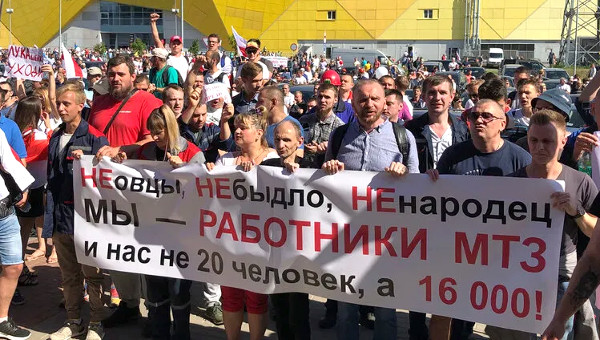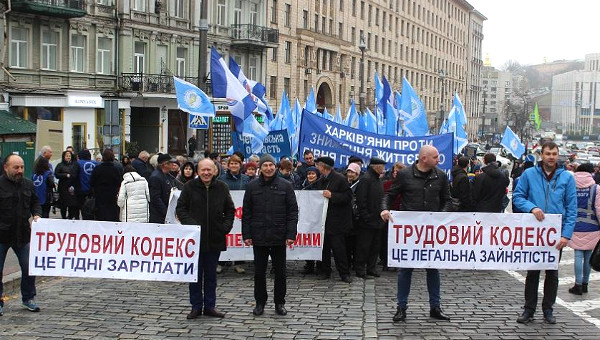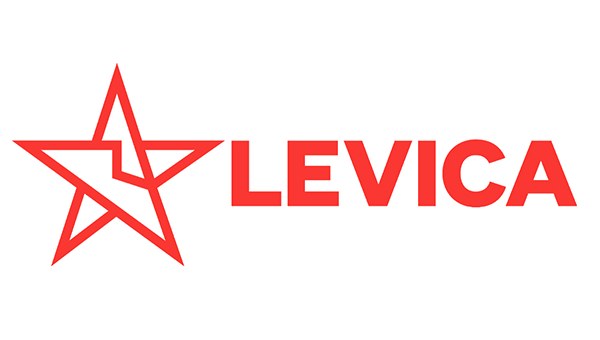Contradictions of the Belarus Protest: What We Can Learn
The crisis in Belarus is intensifying, and even if Alexander Lukashenko manages to retain his hold on power, his authority will remain precarious. In this country’s society, an understanding of the need for change and a preparedness to struggle for it will ripen still further. However exactly the situation develops, it is clear that Belarus (and not only Belarus) will no longer be the same as during the past quarter-century. One question is whether citizens, members of the left, and governments in the post-Soviet countries will succeed in understanding the events now unfolding in Belarus and in drawing the appropriate lessons.
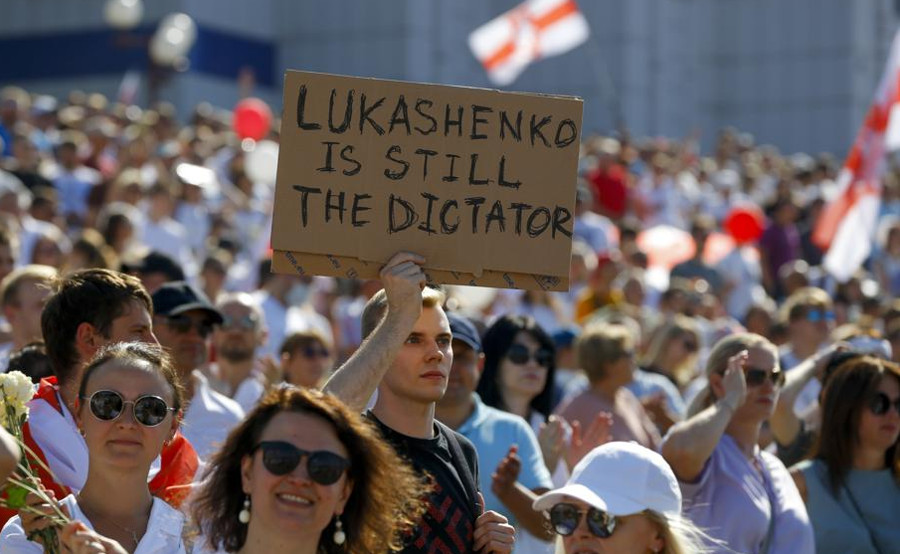
A further question, no less perplexing, is what the content of these lessons will be. To the first of these questions, I am inclined to answer in the negative. Most likely, the people involved will once again fail to learn anything, but this should not spare left-wing theoreticians from trying to spell out the meaning of events. The time has not yet come for definitive conclusions, but some initial thoughts can and should be ventured.
Lesson One: Stagnation Cannot Last Forever
I shall begin with the obvious: systems that appear completely stagnant, in which economic and political power lies fundamentally with the bureaucracy while the citizens are reduced to playing the role of passive consumers of more or less significant “beneficent deeds” on the part of a paternalist state, exist at most for a few decades.
The reason for their degeneration is well known: systems in which economic and political power is exercised basically by the state bureaucracy are unstable as a matter of principle. They are able to exist only as transitional forms in an overall process of development. The trend of this development is either toward the economic and political power of the workers, who subordinate the bureaucracy to their interests (that is, socialism), or else, toward the economic and political power of large-scale capital (in the current conditions, transnational capital), which employs the state apparatus to serve its ends.
For the moment, we shall set the first variant to one side; by 2021, it will be thirty years since the USSR departed into the future, and the further off the bases for discussing the socialism of the twenty-first century are, the greater they become.
Now to the second variant. For the sake of brevity, we shall designate it as the “Lukashenko” system. Its essence is a bureaucratic-paternalist capitalism, and in the course of its existence, new forces with an interest in its transformation have grown up.
The first of these forces is private capital, including small-scale and “human” capital, whose accumulation and power the old bureaucratic system has begun actively blocking. The bearers of this “human capital” deserve special mention. Most of these people are young, aged between 16 and 30. They have been educated, or are being educated, in a neoliberal spirit that reproduces “market fundamentalism.” They inhabit a totally commercialized, so-called “Western” cultural and informational environment. They possess a certain potential for making money (some more so, others less, the latter for the most part only in their imaginations, inflamed by advertising), with the goal of acquiring brand-name goods and being part of the trend. Without question, the Lukashenko system stands in their path.
A second force is the new generation of the Lukashenko nomenklatura, which, in essence, inhabits the same neoliberal environment and whose entire social setting consists of people (from spouses and lovers to children and grandchildren) who live according to these (“Western”) standards. For the members of this stratum, Belarus, its people, and even jobs in the state hierarchy are no more than a basis for accumulating their private power and capital. For a certain time, these people have found life within the bureaucratic system quite advantageous. But as soon as the opportunity appears for them to break out from beneath the power of the hierarchy and win the “freedom” to become private entrepreneurs, they will begin with enviable enthusiasm to demolish the very power structures they so recently embodied. Even now, significant numbers of people from Lukashenko’s entourage are doing this.
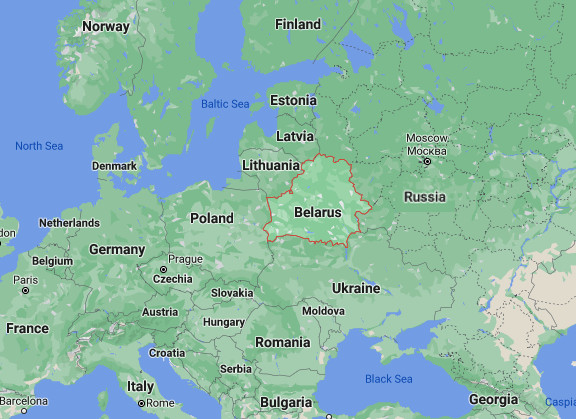
What about the majority of working people – the industrial workers, the teachers, the health staff? Before attempting to answering this question, I should stress that the nature of bureaucratic capitalism is such that it moves inevitably from extensive growth to stagnation, and then the masses shift from enforced support for the system as a lesser evil to vague resistance to it. This is what is now occurring in Belarus.
In this country, an attempt has now been under way for some two decades to combine semi-peripheral capitalism with bureaucratic paternalism. Industry, agriculture, and the infrastructure have developed, and by the standards of the semi-periphery, generally accessible health care and education systems of reasonable quality have been established. (The education, it should be stressed, has mainly been of a globalized-liberal character; this has done much to shape the views of the liberal-minded youth who have passed through the universities, where they have been taught the basics of market fundamentalism along with myths concerning liberal democracy.) Until recently, the level of social differentiation in in Belarus was half that in Russia, and a third less than in the US.
It should be stressed again that bureaucratic-paternalist capitalism is doomed to stagnation and crisis if it does not move in the direction of socialism. Lukashenko has taken the road of strengthening the role of the market and capital, resulting in the stagnation of real incomes, the constriction of the interests of working people through the Labour Code and the pension reform, and so forth. All this has undermined the bases of the system that has taken shape under his rule. Even “ordinary” people in Belarus have begun changing their attitude to the man they once regarded as a sort of parent figure.
So long as the bureaucracy and capital provided certain increases in living standards, with guarantees of security and a stable existence, working people nurtured a vague hatred for the system but nevertheless tolerated it, subordinating and reconciling themselves to it and choosing it as a lesser evil. They did not believe in their own strength or in that of the left opposition, which for the most part was either genuinely powerless or gave way to the authorities at each decisive moment.
But when an old system enters into stagnation, if not crisis, people start to wake up. From that point the “ordinary people” – workers, farmers, teachers, medical personnel – will be ready at a decisive moment to declare: “We are not riff-raff!”
This is why I venture to assert that the root of the problem lies with economic stagnation and social inequality, not merely with the denial of political rights and the lack of freedom of speech. Hence the first lesson, one for the authorities (who, of course, find addressing it inconceivable): if the state-capitalist nomenklatura is unwilling to cooperate with the majority of workers and will not guarantee timely and thorough socially oriented reforms (a progressive income tax, education and health care for all, strong trade unions and so forth), along with accelerated growth of the national economy, then it is an enemy not only of the pro-liberal forces but also of the majority of citizens, and moreover, will sooner or later be betrayed by the new generation of cynics within its own ranks. This, properly speaking, has begun to occur in Belarus.
In Russia the situation is somewhat different: the state bureaucracy has not so much subordinated itself to large oligarchic capital as become entwined with it. For the most part, the Russian bureaucracy serves the economic and political interests of big capital, and hence, possesses a more durable economic base than the Lukashenko system. Underlying the power of the state in Russia are the trillions of dollars owned by the Russian oligarchs. But this alliance is not eternal either. In the Russian Federation, moreover, stagnation and antisocial policies have lasted now for more than a decade, and the patience of the majority, it would appear, is at breaking point. Hence, and unlike the situation in Belarus, it is possible that the outcomes may not be limited to political perturbations, and may extend further and deeper, to socio-economic revolution.
Lesson Two: The People are not Riff-Raff, and the Main Problems Cannot be Solved Through Force
I shall begin with a thoroughly controversial thesis (I address these words to Russian patriots): there is no need to fear the activism of one’s own citizens. The steady development of a country (not stagnation with imitation prosperity!) requires politically and socially active citizens, united on the basis of initiatives from below, and it needs them the way it needs air. Profound social and democratic reforms, implemented on the basis of initiatives from below, are a condition for the socialisation (at least) of twenty-first century capitalism, not to speak of an advance toward the society of the future, toward socialism (modern global capital is not such a condition, since it has no intention of proceeding along such a path, and is thus stagnating, not only in the post-Soviet space). Passively tolerant and obedient citizens, who (as it seems to the authorities and the bosses) have submitted to the status quo, constitute a basis for the breakdown and decay of the state power and even of business. This is the case with the state power since it is increasingly forced to rely on the organs of coercion and on political and ideological manipulation – to be quite frank, on deceit and violence. Such a system cannot exist for long, much less develop. Business also loses out strategically under such a system, since in an economy where the main factor of development is human creative potential, workers need to be talented and creative, and this means that they need the opportunity for social and political self-organization. Meanwhile, strategically oriented development is a matter of indifference to capital in the neoliberal epoch; short-termism and the dominance of financialization orient business toward speculation, to “accumulation by dispossession” (David Harvey), and at times, to straightforward feudal plunder.
Where politics is concerned, the neoliberal economic and political system provides only imitation freedoms, replacing democracy with political manipulation on the part of those who have their hands on capital, creating a system justly described by Marxists as “democracy for the few” (Michael Parenti). In Belarus and Russia, the majority of “ordinary” citizens sense that their democracy is a falsehood, even if they do not understand why. As Aleksandr Blok (yes, the great poet of the Russian Silver Age!) declared a century ago, we need democracy, but not American-style. We need real political rights and freedoms, the real opportunity to form unions and associations, to control the authorities, and to realise initiatives that emerge from below.
This text is not the place to elaborate on what “basic democracy” is and on how it functions. Nevertheless, it should be said that where people lack any real opportunity for joint constructive social and political action, street protests will occur, with all their contradictions. As in the US, or with the “yellow vests” in France, and as in Belarus. Neither secret police nor OMON riot troops will be able to stop it. This is the lesson of Belarus.
Why did Belarus remain silent for so long? There is an explanation for this. Still operating in the post-Soviet expanse is a belief, formed over centuries, in the concept of the “good tsar.” In the USSR (and until recently in Belarus as well), this belief rested on a genuine solicitude of the state with regard to “ordinary” people. We believed (and to some degree still believe) that the “good tsar” would punish the “evil boyars” (ministers, deputies), the excessively greedy bosses and the thieving bureaucrats, while defending the country from external enemies (and they are real!) with the help of a strong army, and in general, would solve all our problems. Unfortunately, this is not an exaggeration – it is what the authorities set out to instil in “simple people” in Belarus, and not only there. It was no accident that until recently Lukashenko was referred to colloquially as “Daddy.”
Nevertheless, the “simple” citizens of the post-Soviet countries are far from simple. We grew out of the culture and practice of the USSR, and thirty years of semi-peripheral capitalism have not degraded us entirely. This applies to the majority of citizens of Belarus, and not only of Belarus, whatever the case with the privileged elites who have adopted neoliberal values.
If bureaucratic capitalism perpetuates, or worse, strengthens economic stagnation and social injustice, if it increases the political lawlessness to which the majority is subject, then the working people who supposedly have been hypnotised forever will rise up in protest.
Here, it is true, an important reservation is required: the real level of activism of the majority of workers, peasants, health staff, teachers, and so forth in Belarus is nowhere as great as the leaders of the liberal opposition try to make out. In most cases the actions that are described as “strikes” are, in fact, protest meetings organized by political activists. Of the real strikes, a certain proportion are indirectly supported by enterprise chiefs who regard the Lukashenko regime as not serving their interests, or by top managers who, as in the USSR on the eve of its collapse, hope that this wave of struggles will give them the opportunity to privatise enterprises that for the present are in state hands. In a few enterprises – and this is the aspect that is most important for us – there is a real potential for strikes to break out. However, such actions are almost impossible to organize because of draconian legislation and the repression directed at the leaders of strike committees. Where workers in these circumstances have been able to organize so-called “Italian” strikes (“work-to-rule actions”), it is possible and necessary to speak of real labour protest. But even here, there is not yet an independent opposition, aimed at defending workers’ interests and not at carrying out the transition from a bureaucratic to a neoliberal model of capitalism.
Lesson Three: The lack of a Left Alternative is Driving Workers into the Camp of the Neoliberals
The popular masses are beginning to rise up in protest. But here the question presents itself: what will the people call for? Who will they stand beside, and at whom will their anger be directed?
If, at this time, there is no left opposition in the country, strong, organized, and capable of constructive, positive action, the people will finish up as puppets whose strings are pulled by neoliberal politicians – by politicians who will, unsurprisingly, be described as “pro-Western” (I should point out that this is not a matter of geopolitics but of political economy – standing behind these politicians will be the economic, political, media, and military power of global capital). If working people finish up as puppets, subject to this control, they will lose (and indeed, we are losing). The reason is simple: in the post-Soviet countries, neoliberal capitalism brings with it an even greater degree of economic degradation, social inequality, and political lawlessness than the systems that preceded it.
Hence the following lessons, for the authorities, for citizens, and for the opposition.
For those in power in the post-Soviet countries, the lesson is this (it will not be assimilated, since it will not, in the short term, suit the purposes of these people): by turning the citizens of your countries into extras in your stage-show, you doom yourself to isolation at the “moment of truth” – that is, at the moment when private capital and the active pro-liberal minority turn away from you, and when the most active elements within your camp realise that it is more advantageous for them to betray you. Add to this the powerful media, economic, and political pressure applied by global capital (I stress: not just Polish or Lithuanian politicians seeking to exert influence on Belarus, but global capital), and if the people are not with you but against you, even if not actively, then you will finish up on your own. Attempting to rely on the apparatus of coercion will prove useless. Not only will force prove unable to solve the problem, but at the decisive moment, the people applying it will simply abandon you, not wanting to finish up on the losing side. This is what happened in the USSR in 1991, and in Ukraine in 2014…
For the mass of the population, the lesson is this: if by the moment of conflict you (we) have not developed a mature social and political consciousness; if we fail to understand who we are, to understand what we are struggling for, who we defend and where our strategic interests lie; and if we behave like suddenly awakened sheep, then at best, we will be herded into a new sheep-pen, and at worst, slaughtered. The authorities will make use of our activism, either the old authorities, after convincing us that they represent a lesser evil, or the new holders of power, hanging out the sign of neoliberal “freedom” while strengthening our subjection to the market and capital.
The lesson for the left opposition is as follows: if, by the “moment of truth,” this opposition has not become powerful and constructive, the role that its members will end up playing will not even be that of extras, but, rather, of onlookers. The onlookers to a tragedy.
PS. The lesson for Russian patriots: you need to think of more than your country’s geopolitical interests.
This section will be highly controversial, and relatively brief.
Today the overwhelming majority of politicians, journalists, and expert analysts, when they reflect on Belarus and Russia, give first place to questions of geopolitics. Meanwhile, they voice a particular refrain, harsh if not always prominent: “We (Russia) need to think about our interests, about what is and isn’t to our advantage in the Belarus conflict, and about who may or may not be useful to us.” At the same time, and as something no less obvious, they repeat the line that we are two fraternal peoples, two countries within the framework of a single union state…
For all that, it does not even occur to most Russians that a profound contradiction is involved here: if we are brothers, then the Russian people as real brothers and comrades should in the first instance be thinking of the interests of the Belarusian people, and not of geopolitical benefits for the Russian state, benefits that are being eyed all too obviously by the commercial interests of large Russian capital.
The Belarusians, too, sense these self-seeking motives of the real owners of Russia.
It is important to note that we, the multinational people of Russia, have a genuine, profound unity of interests with the multinational people of Belarus. This results not only from our shared historical past, and not only from the heroic victory in the Great Patriotic War (patriotic, I would add, for Russians, for Belarusians, and for all the peoples who made up the USSR). It stems also from the priceless experience that our peoples accumulated of building socialism, and from the unity of our cultures. And most important of all: it is easier and more productive for us if we develop together in this world, which is full of deep problems and contradictions.
But!
But Russian and Belarusian capital are competitors. We produce almost the same things, we fight over every dollar in the price of energy carriers, and vie with one another for “beneficial” investments from the West and East.
But in geopolitics, there are no friends, only rivals in the struggle for spheres of influence, for territory, for profits for one’s capital.
But the “patriots” (the inverted commas are no accident) of our country maintain: “Russia has no friends apart from its army and navy…”
So it is. In conclusion, I would like to spell out a lesson for patriots (without inverted commas) and for those sections (political, mass-media, cultural) of the establishment that think genuinely about the future of the peoples of Russia and Belarus, and not about the advantages for Russian or Belarusian capital, the interests of the two countries’ bureaucrats, and so forth. This lesson is simple: for the peoples of Russia and Belarus (and, indeed, for all others), there is only one strategic path that holds out any strategic promise. That is the path that leads to the transformation of working people (not “factory hands,” but modern workers – scientists, programmers, teachers, medics, artists) from passive cogs in the bureaucratic machine and slaves of money, trends, and brands into owners of the economy and politics, people who put the progress of humanity above profits and politicking. If Russia offers Belarus (and not only Belarus) a road of this kind, first of social reforms and then of socialism (I have no fear of this concept, all but forbidden in “serious” articles), then the majority of the citizens (not capital holdings, not politicians, but citizens) of Belarus will be our friends. And not only of Belarus.
If we seek gains for our capital and benefits for our geopolitical interests, we can expect to lose everything and everyone, just as we have already lost almost all our friends in the post-Soviet space. For the present, Belarus remains… •
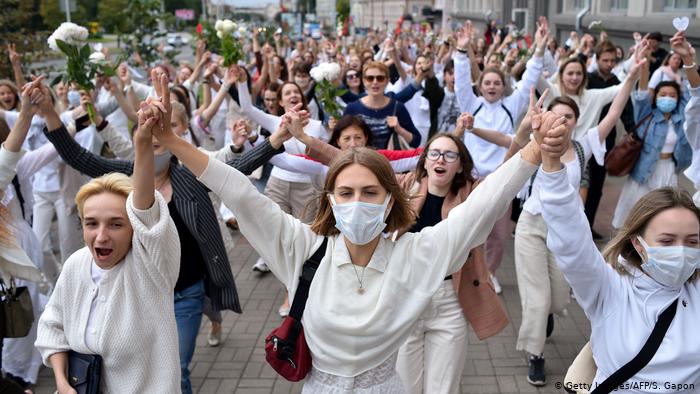
Protest in Belarus: Who? Why? With What Aims?: A Politico-Economic Analysis
The wave of debate that has followed the events in Belarus has left out of the account the key questions: why are people taking to the streets of Minsk and other cities, and just who are these people? What exactly do they want, that they are prepared to risk their freedom, their health, and even their lives? Why are there many tens of thousands of them, probably more? And why is this happening in Belarus, to all appearances an unusually peaceful and stable country, with strong historical traditions of antifascism and of friendship with Russia?
Before suggesting answers to these questions, let me stress: I am not writing these lines as a mere onlooker. My homeland was and remains the USSR, of which Belarus is an inseparable part. These are the lines of someone who has many comrades in Minsk, and to whom the fate of Belarus is not a matter of personal indifference.
The Essence: Belarusian Capitalism
At the heart of the country’s present-day problems are the peculiarities of its socio-economic and political system. The last few decades have seen the formation in Belarus of an entirely distinctive model of semi-peripheral capitalism – of a system in which economic and political power does not, fundamentally, lie with private capital but with a bureaucratic-paternalist state apparatus, whose symbol (though not its owner) is Lukashenko.
Unlike the situation in the Russian Federation and most other countries of the Commonwealth of Independent States, large-scale oligarchic capital is only weakly developed in Belarus, and its relationship to the state apparatus is for the most part a subordinate one. Accordingly, the elements of private capital that are not intertwined with the bureaucracy submit to the functionaries and pay tribute to them. It is important to note that this subordination is not just economic in nature, but also administrative, political, and even cultural-ideological. This applies to small, middle, and large businesses alike (the situation in Russia is similar, but here the capital-owning class taken together dominates the state, while in Belarus the reverse is true).
It is significant that in Belarus the state is at once paternalist and bureaucratic-capitalist. In the first of these roles, it devotes a substantial part of its resources to maintaining industry, the rural sector, infrastructure, and the population. In its second role, the bureaucracy, intermingled with capital, subjugates and exploits the majority of working people in both economic and administrative-political fashion, acting as a state capitalist.
The Worker Majority
The key point here is that in Belarus, working people (I employ this concept, now so little used, quite deliberately), who not so long ago lived relatively prosperous and secure lives on the whole, have been deprived of the chance to be human beings instead of mere cogs in a machine, parts of a depersonalized, obedient mass. They have been robbed of the opportunity to be individuals, subjects of economic, political, and cultural life, instead of passively obedient objects of the ministrations (with inverted commas, and without) of “Daddy” Lukashenko.
It is also true that the “prosperity” of most Belarusian workers in recent times has become altogether relative: economic and social development has slowed, while social inequality has increased. The result has been a hidden readiness on the part of most ordinary Belarusians to support the protests. But at the same time, there is also a fear of losing the relative stability of their paternalistically guaranteed existence. Hence the position that until recently most of the country’s rank and file workers implicitly embraced: for change, but not for liberal capitalism, and thus, if there was no alternative, then better that Lukashenko should stay.
In the course of the protests, however, Lukashenko’s exclusive reliance on force has altered the situation, not just by the day, but by the hour. “Ordinary” citizens have been waking up and coming to realise that paternalism implies not just stability but also stagnation. Meanwhile, capitalism, even of the paternalist-bureaucratic variety, involves exploitation and subjection…
The Opposition: Who and Why
The fundamentally capitalist nature of Belarusian society fosters an orientation in the majority of the population, especially the youth (and still more, the “elite” youth), toward the liberal-consumerist system of values that dominates the world in the twenty-first century.
(As an important digression, I would note that this system of values is often, mistakenly, described as “Western.” But it is not Western; it is a world-wide system of interests and values that is shaped by global capital, even though its roots lie in the West, and it has acquired a “residence permit” in the East.)
Prime place in this system of values is held by self-enrichment, which is directly associated with the consumption of prestige brands, with being “part of the trend,” and with individualism – that is, with everything that forms the basis of the ideology and psychology of neoliberalism. In paternalist-capitalist Belarus, these goals of young people are, on the one hand, cultivated (by capitalism) and on the other hand, blocked (by bureaucratic paternalism). The result is a contradiction that has led to an explosion. Allied to this is the position of a significant section of the middle and petty bourgeoisie, as well as of freelance professionals and of all those who consider themselves (falsely, for the most part!) to be the owners of a substantial “human capital.” The latter cast of mind is especially characteristic of young people from the large cities who have received a Western-style education.
(I shall permit myself another important digression: in Lukashenko’s Belarus, the basically capitalist education system has always taught young people in accordance with United State precepts, whether in economics, management, philosophy, or political science.)
Further, I would note the lack of any opportunity for self-expression or for criticism of the existing system. All this is in the context of an objectively inevitable economic, informational, and cultural intermingling with global politico-economic capital (“the West”).
As a consequence, the social strata listed above, which comprise the so-called “middle class” in large cities (in reality, these are the uppermost 15 to 20 per cent of the population), have come in their majority to represent the opposition to the Lukashenko system. These people are far from being a majority overall, but they are active in political and informational terms.
Here we encounter another factor: the bureaucracy, remote from the actual lives, interests, and problems of the people and of the country as a whole, and not subject to control by the citizens, has inevitably “grown stupid,” losing out intellectually to the opposition as well. The result is that the protesters, in most cases, are also winning the information and communications war over the authorities. To this, the latter have responded with increasing levels of brute force, which simply multiplies the number of their opponents…
The External Factor
Finally, we must also take account of the external factor. Belarus is bordered to the north and west by member countries of the EU (with the US standing behind them), to the south by Ukraine, and to the east by Russia (and China, in the political if not geographical sense). In its struggle for Belarus as an economic, political, and military bridgehead, the “West” acts forcefully; against ordinary Belarusians, especially younger ones, it deploys not just money and sophisticated political techniques, but most important, modern methods of cultural, ideological, and informational manipulation. The “East” is losing, acting weakly, and employing outmoded methods. It is attempting to solve the problems it confronts exclusively on the plane of personal relationships between leaders, of economic deals, and of operations by secret police services.
The sum of all this provides an answer to the question of which people are joining the protests and why.
The Barricades of Protest
The source of today’s protests is the objective rejection of the existing Belarusian economic and political system by the majority of the so-called “middle class,” which with informational and organizational support from the “West” has gradually reached the point of open struggle. Adding to the readiness of this stratum to come into the streets, there have been additional factors, nurtured especially to serve this end – nationalist sentiment, money, provocations, and the work of political and other specialists. The broth of protest has come to the boil.
Who is now standing on the other side of the barricades? Obviously, the state apparatus and its machine of coercion. And what about the majority of workers?
For the present (this text was written on 12 August), most of them are remaining on the sidelines, declining to take part directly in the protests, as they sense half-consciously that for the working people of Belarus, a victory for the neoliberal opposition would turn into a worse evil than if the existing system were to prevail. Let me explain: the workers, peasants, teachers, and medical personnel of Belarus will not win political freedom as a gift from the neoliberal system. At best, they will be granted formal concessions that conceal the total manipulation of public opinion by global corporate capital and its political representatives. At worst, they will finish up beneath the dictatorship of nationalists with pro-fascist inclinations. Economically, the worker majority (including the naïve young protesters) will not receive anything from neoliberalism except the curtailing of already scant social benefits, and the opportunity to transform themselves from a paternalistically defended proletariat (though one without political rights) into an impoverished, politically unorganized precariat, which serves as a perfect nutrient medium for nationalism and dictatorship.
But that’s for the present. If the system of repression grows and becomes self-perpetuating (and this tendency is innate in a repressive state system that is not under the control of citizens), the wave of protests will come to include “ordinary” Belarusians. Like it or not, they will come to understand that the existing regime is prepared to direct reprisals against everyone without distinction and that tolerating such oppression is impossible.
At that point the majority of the Belarusian people, who for all their patience are fearless when enraged, will start rising up in earnest…
Postscript
“Belarus, our own dear land…” – the words are from an old song – is a part of our past, but not only of our past. It is a part of fate, of a fate at whose heart lies not just the victory in the great war against fascism, but also the victory of creative activity. Moreover, this is creative activity carried on even under the most monstrous conditions, and on the basis of people’s own initiative and self-organization. An example is the partisan movement. It was precisely here that Belarus showed an example for everyone of how a people can struggle against an enemy. It was not by chance that it was in Minsk, on the very streets and squares where today the clashes are taking place, that the first parade of the Great Patriotic War took place – a demonstration and parade by thirty partisan brigades, lasting for several hours on 16 July, 1944. On the following day 57,000 captured German officers and troops were led through the streets of Moscow, and the asphalt was washed after they had passed… •
This second essay first published on the Links International Journal of Socialist Renewal website.


